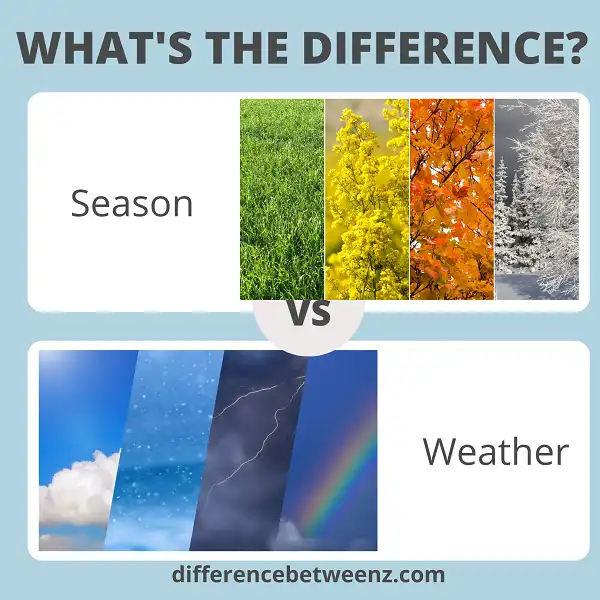What is the difference between season and weather? Season refers to a period of time with a specific set of characteristics, while the weather is the state of the atmosphere at a particular time and place. Seasons are usually determined by the Earth’s orbit around the sun, while the weather is determined by local conditions. Generally, four seasons can be observed in most parts of the world: winter, spring, summer, and fall. Weather can vary greatly from day to day and region to region.
What is Season?
The season is a particular time of the year when certain weather conditions normally occur. The season is caused by the Earth’s tilt on its axis as it orbits around the sun. There are four seasons in a year: spring, summer, autumn (fall), and winter. The transition from one season to another happens because the Earth’s tilt changes the amount of sunlight that hits different parts of the planet.
- This happens over the course of about three months. For example, in North America, spring starts around March 20th. This is when the Earth’s tilt starts to allow more direct sunlight to hit the part of the planet that is north of the equator. More direct sunlight means warmer temperatures. The warm air rises, and this causes low-pressure systems to form.
- These low-pressure systems help to create storms. Summer in North America starts around June 21st and ends around September 23rd. This is when the Earth is tilted so that the part of the planet that is north of the equator gets direct sunlight almost all day long.
- Direct sunlight creates high temperatures, and this can cause thunderstorms to form. Autumn (fall) in North America starts around September 23rd and ends around December 21st.
- This is when the Earth’s tilt starts to allow more direct sunlight to hit the part of the planet that is south of the equator. As a result, temperatures start to cool down, and leaves start to change color and fall off of trees. Winter in North America starts around December 21st and ends around March 20th.
This is when the Earth’s tilt causes the part of the planet that is north of the equator to be mostly in darkness or have very little direct sunlight. As a result, temperatures stay cold, and snow falls from clouds.
What is the Weather?
Weather is the state of the atmosphere, to be exact, it is the temperature, humidity, precipitation, air pressure, and wind speed. Weather can be measured in Fahrenheit or Celsius. The Weather Channel is a great place to get your daily weather report. Weather can change very quickly, so it is important to check the forecast before you leave for work or school in the morning. If you are planning a trip, you will also want to check the weather at your destination. Some people like to check the weather before they go to bed so they know what to expect when they wake up in the morning. Weather can be very unpredictable, so it is always a good idea to be prepared for anything.
Difference between Season and Weather
Season and weather are often used interchangeably, but there is a distinct difference between the two.
- The season is determined by the Earth’s position in relation to the sun, while the weather is the day-to-day temperature and precipitation.
- Seasonality can be helpful in predicting long-term trends, such as when certain crops will be ready for harvest, but it doesn’t provide much information about what to expect on a given day.
- That’s where the weather comes in. Meteorologists use a variety of tools to track and predict short-term changes in the atmosphere.
- This information can be used to make decisions about everything from what to wear to whether or not to cancel outdoor plans.
So, while season and weather may seem similar, they actually provide different types of information that can be used to plan for the future.
Conclusion
Season and weather are two words that are often confused. Though they have similar meanings, there is a big distinction between the two. Weather refers to the conditions of the atmosphere in a certain place at a certain time. These conditions can include temperature, humidity, wind speed, and precipitation. Season, on the other hand, refers to the time of year in which something happens. There are four seasons- spring, summer, fall/autumn, and winter- each with its own unique characteristics.


